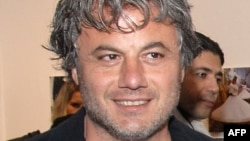PARIS — Syria's government faced multiple setbacks Wednesday, with a reported suicide bomb attack killing the defense minister and other senior officials. Meanwhile in Paris, a key Syrian military defector has finally surfaced in the French capital and has made his first statement.
In a statement sent to the Agence France-Press news agency, Syrian General Manaf Tlass blames Damascus for much of the conflict that has torn his country apart. A once-close ally of Syrian President Bashar al-Assad, General Tlass expressed hope the bloodshed would end in Syria and that a political transition will take place guaranteeing the country's unity, stability and security.
He said he is pained at seeing the Syrian army fight against its people and that he was called a traitor for refusing to join in.
Tlass is considered one of the Syrian government's highest ranking defectors. But he has kept a low profile since fleeing his country in early July and French officials have not been clear about his whereabouts.
Only at a news conference on Tuesday night did French President Francois Hollande confirm that General Tlass was in Paris.
Tlass was once a key member of President Assad's inner circle. His father was the longtime defense minister of President Assad's father, Hafez al-Assad.
In his statement to AFP, Tlass made no mention of joining the Syrian opposition. A Syrian opposition member contacted by VOA for comment did not immediately return the call.
But Syria analyst Nadim Shehadi, of the London-based think tank Chatham House, says the importance of General Tlass' defection is mostly symbolic.
"The father had been sidelined for almost 10 years and Manaf Tlass himself was sidelined [for] the last six months or so," said Shehadi. "So this does not affect the operational side of the regime. But what I think is most important is how this affects the legitimacy of the regime."
With that legitimacy eroding ever faster, Shehadi says, it's intensifying the dilemma for Russia, one of Syria's staunchest allies. "…whether [Russia should] continue sticking their neck out in support of the regime because they stand to lose a lot once it falls," said the analyst.
Russia has been blocking efforts in the U.N. Security Council to impose tougher sanctions against President Assad and his government.
In a statement sent to the Agence France-Press news agency, Syrian General Manaf Tlass blames Damascus for much of the conflict that has torn his country apart. A once-close ally of Syrian President Bashar al-Assad, General Tlass expressed hope the bloodshed would end in Syria and that a political transition will take place guaranteeing the country's unity, stability and security.
He said he is pained at seeing the Syrian army fight against its people and that he was called a traitor for refusing to join in.
Tlass is considered one of the Syrian government's highest ranking defectors. But he has kept a low profile since fleeing his country in early July and French officials have not been clear about his whereabouts.
Only at a news conference on Tuesday night did French President Francois Hollande confirm that General Tlass was in Paris.
Tlass was once a key member of President Assad's inner circle. His father was the longtime defense minister of President Assad's father, Hafez al-Assad.
In his statement to AFP, Tlass made no mention of joining the Syrian opposition. A Syrian opposition member contacted by VOA for comment did not immediately return the call.
But Syria analyst Nadim Shehadi, of the London-based think tank Chatham House, says the importance of General Tlass' defection is mostly symbolic.
"The father had been sidelined for almost 10 years and Manaf Tlass himself was sidelined [for] the last six months or so," said Shehadi. "So this does not affect the operational side of the regime. But what I think is most important is how this affects the legitimacy of the regime."
With that legitimacy eroding ever faster, Shehadi says, it's intensifying the dilemma for Russia, one of Syria's staunchest allies. "…whether [Russia should] continue sticking their neck out in support of the regime because they stand to lose a lot once it falls," said the analyst.
Russia has been blocking efforts in the U.N. Security Council to impose tougher sanctions against President Assad and his government.




